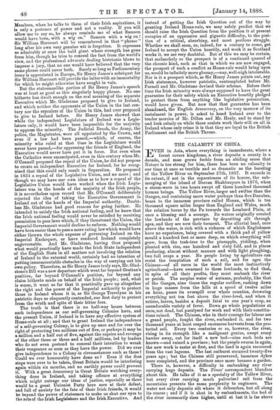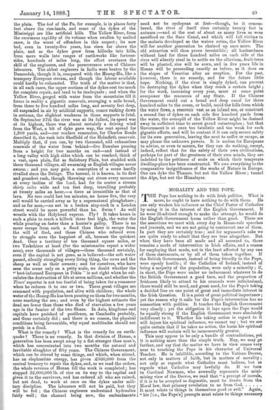THE CALAMITY IN CHINA. E VEN in Asia, where everything is
immoderate, where a forest covers kingdoms, a river deposits a county in a decade, and man grows feeble from an abiding sense that Nature is too strong for him, there has been no calamity in our time at once so terrible and so dramatic as the bursting of the Yellow River on September 27th, 1887. It exceeds in its extent, if not in the separateness of its horror, the sub- merging of the island of Deccan Shahbazpore in 1876, when a storm-wave in two hours swept off three hundred thousand human beings. The Yellow River, larger and swifter than the Ganges, and containing more water perhaps than five Danubes, bears to the immense province called Honan which is ten thousand square miles larger than England and Wales, much the relation borne by the Po towards the Lombard Plain, at once a blessing and a scourge. Its waters originally created the lowlands of the province by depositing silt through ages, and they are now their torment. The alluvial land, once above the water, is rich with a richness of which Englishmen have no experience, being covered with a thick pad of yellow mould a hundred feet or more deep, on which everything will grow, from the teak-tree to the pineapple, yielding, when planted with rice, one hundred and sixty fold, and in places producing, almost without manure and with light ploughing, two full crops a year. No people living by agriculture can resist the temptation of such a soil, and for ages the Chinese—of all races in the world the most instinctively agricultural—have swarmed to these lowlands, to find that, in spite of all their profits, they must embank the river or perish. The surplus water of autumn, probably, like that of the Ganges, nine times the regular outflow, rushing down in huge masses from the hills at a speed of twelve miles an hour, pours its overspill over whole counties, drowning everything not tea feet above the river-level, and when it retires, leaves, besides a deposit fatal to one year's crop, an unendurable variety of fever. Down go whole populations at once, not dead, but paralysed for work and with their constitu- tions ruined. The Chinese, who in their courage for labour are a grand people, fought the river, embanked it, and for two thousand years at least reaped enormous harvests from the pro- tected soil. Every two centuries or so, however, the river, rising in its strength like a malignant genius, swept every barrier away, cut for itself a new bed—nine such beds are known —and ruined a province ; but the people swarm in again, the new work is easier at first, and the land is again recovered from the vast lagoons. The last outburst occurred twenty-five years ago ; but the Chinese still persevered, immense dykes were completed, and the province once more became a garden. There is, however, a difficulty in embanking any river carrying huge deposits. The Times' correspondent blunders about this. He talks of it as a specialty of the Yellow River, but every river carrying much pulverised soil from the mountains presents the same perplexity to engineers. The water not only deposits silt where it debouches, but all along its course ; and if it is shut in by embankments, the bed of the river incessantly rises higher, until at last it is far above the plain. The bed of the Po, for example, is in places forty feet above the rice-lands, and some of the dykes of the Mississippi are like artificial hills. The Yellow River, from the enormous rapidity of its volume when swollen by melted snow, is the worst of offenders in this respect ; its new bed, even in twenty-five years, has risen far above the plain, and as the dykes grow from hillocks into hills, from mere walls into ranges of earthworks like fortress- sides, hundreds of miles long, the effort overtaxes the skill of the engineers, and the perseverance even of Chinese labourers. The ablest engineers in India were beaten by the Damoodah, though it is, compared with the Hoang-Ho, like a trumpery European stream, and though the labour available could hardly be exhausted. The truth of the matter is that, in all such cases, the upper sections of the dykes cost too much for complete repair, and tend to be inadequate ; and when the Yellow River, gorged with water from the mountains till it forms in reality a gigantic reservoir, averaging a mile broad, from three to five hundred miles long, and seventy feet deep, all suspended in air by artificial supports, comes rushing down in autumn, the slightest weakness in those supports is fatal. On September 27th the river was at its fullest, its speed was at its highest, there was almost certainly a driving wind from the West, a bit of dyke gave way, the rent spread for 1,200 yards, and—our readers remember, for Charles Reade described it, the rush into Sheffield of the Holmfirth reservoir. Multiply that, if you can, by two thousand, add exhaustless renewals of the water from behind—five Danubes pouring from a height for two months on end—and instead of a long valley with high sides which can be reached, think of a vast, open plain, flat as Salisbury Plain, but studded with three thousand villages, all swarming as English villages never swarm : and you may gain a conception of a scene hardly rivalled since the Deluge. The torrent, it is known, in its first and grandest rush, though throwing out rivers every moment at every incline of the land, had for its centre a stream thirty miles wide and ten feet deep, travelling probably at twenty miles an hour,—a force as irresistible as that of lava. No tree could last ten minutes, no house five, the very soil would be carried away as by a supernatural ploughshare; and as for man,—an ant in a broken stop-cock in a London street would be more powerful than he. Swim ? As well wrestle with the Holyhead express. Fly ? It takes hours in such a plain to reach a hillock three feet high, the water the while pouring on faster than a hunter's gallop. There is no more escape from such a flood than there is escape from the will of God, and those Chinese who refused even to struggle were the happiest of all, because the quickest dead. Over a territory of ten thousand square miles, or two Yorkshires at least (for the missionaries report a wider area), over thousands of villages—three thousand certainly, even if the capital is not gone, as is believed—the soft water passed, silently strangling every living thing, the cows and the sheep as well as their owners ; and for ourselves, who have seen the scene only on a petty scale, we doubt whether the "best-informed European in Pekin" is not right when he cal- culates the destruction of life at seven millions, and whether the Times' reporter is not too fearful of being taken for a romancer when he reduces it to one or two. These great villages are crammed with population, and alive with children ; the whole water of the bang-Ho has been pouring on them for two months, none reaching the sea ; and even by the highest estimate the dead are fewer than those who died of starvation a few years ago in the famine of the two Shans. In Asia, kingdoms and capitals have perished of pestilence, as Cambodia probably, and Gour certainly did ; and there is no reason, the physical conditions being favourable, why equal multitudes should not perish in a flood.
What is the remedy ? What is the remedy for an earth- quake? There is no remedy. In that division of Honan, a generation has been swept away by a fiat stronger than man's, which has concentrated into two months the natural and inevitable slaughter of fifty years. The Chinese Government, which can be stirred by some things, and which, when stirred, has an elephantine energy, has given £500,000 from the central treasury to repair the dykes, and, as we read the orders, the whole revenue of Honan till the work is completed ; has stopped 32,000,000 lb. of rice on its way to the capital and given it to the survivors, and has ordered all who are ruined, but not dead, to work at once on the dykes under mili- tary discipline. The labourers will not be paid, but they will be fed ; the Chinese engineers understand hydraulics fairly well ; the channel being new, the embankments
need not be cyclopean at first—though, be it remem- bered, the river of itself rises certainly twenty feet in autumn ;—and at the cost of about as many lives as were sacrificed on the Suez Canal, and which will fall victims to the malaria developed as the waters retire, the Yellow River will for another generation be chained up once more. The old attraction will then prove irresistible ; all husbandmen without land for three hundred miles on each side of the river will silently steal in to settle on the alluvium, fruit-trees will be planted, rice will be sown, and in five years life in Honan will be proceeding exactly as before, as it does on the elopes of Vesuvius after an eruption. For the past, however, there is no remedy, and for the future little hope. Nothing, if the river is simply dyked, can prevent its destroying the dykes when they reach a certain height ; for the work, increasing every year, must at some point overpower the resources of any State. If the Chinese Government could cut a broad and deep canal for three hundred miles to the ocean, or build, amid the hills from which the water flows, a reservoir vast as an inland sea, or construct a second line of dykes on each side five hundred yards from the water, the overspill of the Yellow River might be drained away in sufficient time to arrest grand catastrophes ; but that Government is at once too fatalistic and too weak for such gigantic efforts, and will be content if it can only secure safety for its own generation, leaving the next to suffer or escape, as may please the unknown powers. It is useless for Europeans to advise, or even to mourn, for they can do nothing, except, indeed, reflect that for the safety of their own civilisations, perhaps for part of the greatness of their own minds, they are indebted to the pettiness of scale on which their temperate dwelling-place has been constructed. We owe everything to the comparative insignificance of the works of Nature in Europe. One can dyke the Thames, but not the Yellow River ; tunnel the Alps, but not the Himalayas.







































 Previous page
Previous page